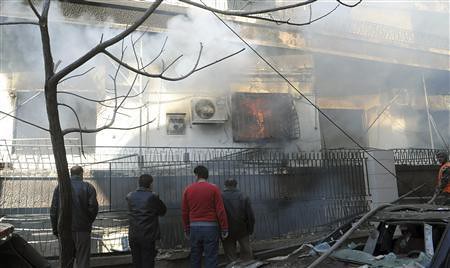
Scene in Damascus, Syria where a bombing took place near the intelligence headquarters on March 17, 2012. For the past year Syria has been under attack by western-backed rebels who are supported by special forces from the imperialist countries., a photo by Pan-African News Wire File Photos on Flickr.
UN Security Council endorses Kofi Annan’s proposal for Syria
Proposal calls for peace talks, end to violence
By Colum Lynch
Washington Post
March 22, 2012
UNITED NATIONS - The UN Security Council endorsed international emissary Kofi Annan’s diplomatic plan Wednesday to stop violence in Syria, crack open the door to humanitarian relief, and prod the Syrian government and the opposition into talks on a political settlement.
The endorsement constituted a rare show of unity by the Security Council on the crisis in Syria, where more than 8,000 people have been killed since President Bashar Assad’s government launched a crackdown on protesters a year ago. It also adds muscle to the efforts of Annan, who serves as the joint UN-Arab League envoy to Syria, to persuade Assad to accept his terms.
A Security Council statement is less forceful than a legally binding resolution but often serves as a first step toward tougher action.
The United States and its Arab and European partners have pressed for passage of an Arab League proposal that would have required Assad to yield considerable powers to a transitional government.
But Russia, backed by China, recently vetoed a resolution endorsing that plan, insisting that the Syrian government should remain central to any negotiations on a political settlement in Syria.
To secure Russian support, the council’s Western and Arab powers were forced to offer several concessions. A council statement, as a result, includes no condemnation of Syria, no specific timetable for a political transition, and a watered-down threat of possible action against Syria if it fails to comply with the Annan plan.
At the last minute, the statement’s sponsors also removed a US amendment demanding that Syria immediately allow UN humanitarian workers unimpeded access to civilians.
Still, Russia’s and China’s support for the statement represents a considerable blow to Assad, who has counted on the council’s disunity in rebuffing past diplomatic entreaties.
US Ambassador Susan Rice characterized the council’s action as a modest step but added that it offered the greatest hope of reuniting the 15-nation council.
“As the council recognized,’’ Rice said, “Annan’s proposal is the best way to put an end to the violence, facilitate much-needed humanitarian assistance, and advance a Syrian-led political transition. We urge the Syrian authorities to respond swiftly and positively.’’
The council’s action comes less than a week after Annan, a former UN secretary general, appealed to the Security Council in a closed-door session to rally behind his initiative and reflects mounting concern that the worsening violence could descend into a protracted civil war.
In continued violence Wednesday, activist groups said 52 people were killed across Syria, including at least 25 who died in shelling by government forces against the Homs neighborhood of Khaldiyeh, a rebel stronghold. The figures could not be independently verified, but the reports of violence are consistent with indications that the government is still pressing an offensive to crush the yearlong revolt.
There were also reports of firefights in two Damascus suburbs, Harasta and Arbeen, between government forces and rebel fighters.
Meanwhile, in a statement on a jihadist website, a new Islamist group called al-Nusra Front claimed responsibility for an unspecified number of recent bombings, including two attacks in Damascus during the weekend that targeted branches of the Syrian security services.
The UN statement endorses a six-point plan that Annan presented this month to Assad and that calls on the Syrian leader to halt his military crackdown and appoint an envoy to participate in talks with the opposition.
The plan urges Assad to “commit to stop the fighting and achieve urgently an effective United Nations supervised cessation of armed violence’’ and to join in a “Syrian-led political process’’ that will “address the legitimate aspirations of the Syrian people.’’
It would require Assad to immediately cease military advances on towns, end the use of heavy weapons, including tanks and artillery, and “begin pullback of military concentrations in and around population centers.’’
No comments:
Post a Comment